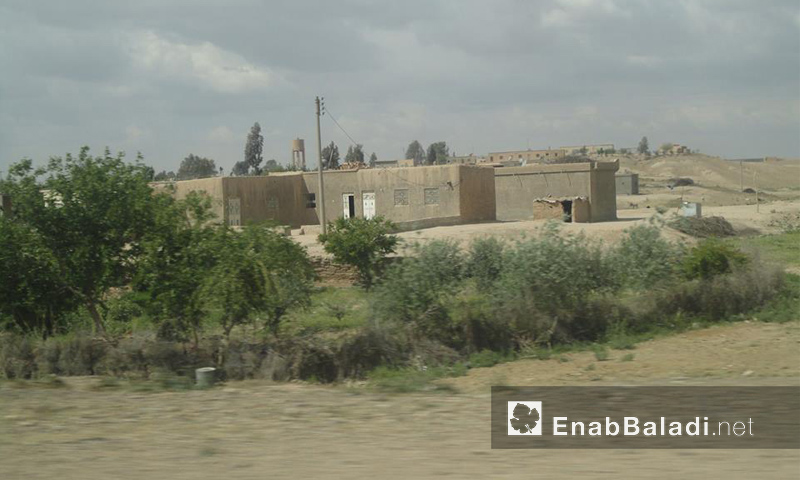Burhan Othman – Enab Baladi
Syrian culture is awash with proverbs highlighting the importance of surrounding yourself kind, well-meaning people who can exert positive influence over personal and family life. Sayings such as “the neighbor before the house,” or that “seven neighbors are recommended” (hadith) or “a nation of neighbors is precious” are just some of these expressions,What happens, though, when your neighbor fights for ISIS?
A number of people who had fled Raqqa told Enab Baladi that ISIS members living among them that the non-fighters were left with a sense of bitterness. Azam, from the Firdous neighborhood of Raqqa, said that he felt oppressed and persecuted and was treated as a second class citizen when compared to his ISIS-affiliated neighbors who he saw enjoying uninterrupted access to electricity, commanding large salaries, owning a car, and dining on fine foods. He noted that these double standards have compounded the misery for many residents. “Most people feel exiled in their own communities,” he said, “and this especially true after ISIS recently began distributing property to its members so that they are spread out among the various quarters of the city. Such impositions make the residents lament their fate, yet leave them unable to express their frustrations, because to refuse the wishes of ISIS makes them an enemy and this accusation may condemn them and their companions to death.”
Proximity Bestows Favor
Not all residents are opposed to living alongside ISIS members. According to some, this proximity is a valuable opportunity from which they might profit, as described by Qassim Al-Muhammad, a resident of Raqqa who sees himself as possessing “expertise in choosing houses and their neighborhoods.” He added that “living near an ISIS fighter may grant numerous advantages, such as access to the organization’s revenues and other favors that constitute a form of protection or intercession by the group on the behalf of the favored person and which might improve their status.” However, Mr. Hussein, the patriarch of a five-person household in the working-class neighborhood of Diriyah, counters Qassim’s opinion, stating that “despite the advantages, living amongst ISIS members brings with it substantial risks. And I, myself, fear my sons mixing in with the group.” In particular, he pointed out his fear that his family and his sons would be swayed by the ideology and might join the group.
As a result, Hussein fears for his family, and thinks often of fleeing the city, should the opportunity arise. Yet he asks, “where should we go?” as he notes the lack of any safe havens in the midst of a war that rages on all fronts.
The Immigrants’ Dangers
Ream, an emigrant from Deir Az-Zour now living near the As-Sakhani neighborhood, described the area as “disgraceful” as she notes its state of neglect and poverty. She was living with her family in one of the city schools before ISIS forced them out.
Ream cares for her sick mother and injured brother. She characterizes the close proximity of ISIS members as “dangerous” because she fears the shelling that targets them on a daily basis. Yet, she draws a distinction between local and foreign fighters, with foreigners drawing greater risk. Additionally, dealings with foreign fighters are more difficult, owing to their lack of understanding regarding local customs.
A High-Ranking Leader
The young street vendor, Rami, says that “the leadership cadre of ISIS is the most dangerous and the most extreme in their dealings with neighbors. I think I’m neighbors with a minister or a governor, which is terrifying. In the end, please keep what we discuss about him confidential.”
Rami cannot lead a normal life. “I can’t speak loudly and I’m forced to go to the mosque, even if I’m sick. All of this is on top of the lectures and sermons that my family and I hear every day from ISIS fighters and their wives.”
He added, “I feel my life is laid bare and that we are under constant surveillance, as our houses can be threatened with inspections at any moment.”
Alienation from ISIS
According to a review by Enab Baladi, ISIS members view any negative discussion of living in their midst as an affront to the Islamic State. According to them, sharing your neighborhood with ISIS brings strength and glory to all who truly love their religion. Those who publish against them or cast doubts about them is an enemy.
However, such views are in direct opposition to of a majority of activists and residents with whom Enab Baladi spoke. According to these interviews, the behavior of ISIS members repulses most locals and was a reason they left the city. The regions controlled by ISIS continuously hemorrhage people their residents and it has gotten so bad recently that the organization has had to issue laws to halt the exodus, monitor transit points, and cut off routes of escape.











